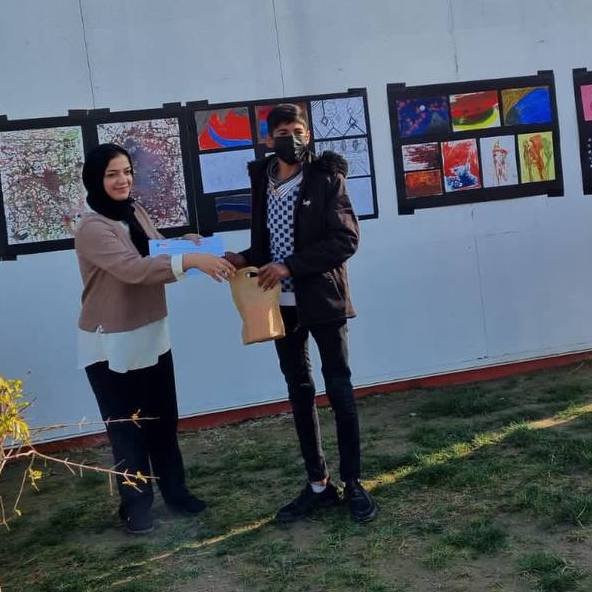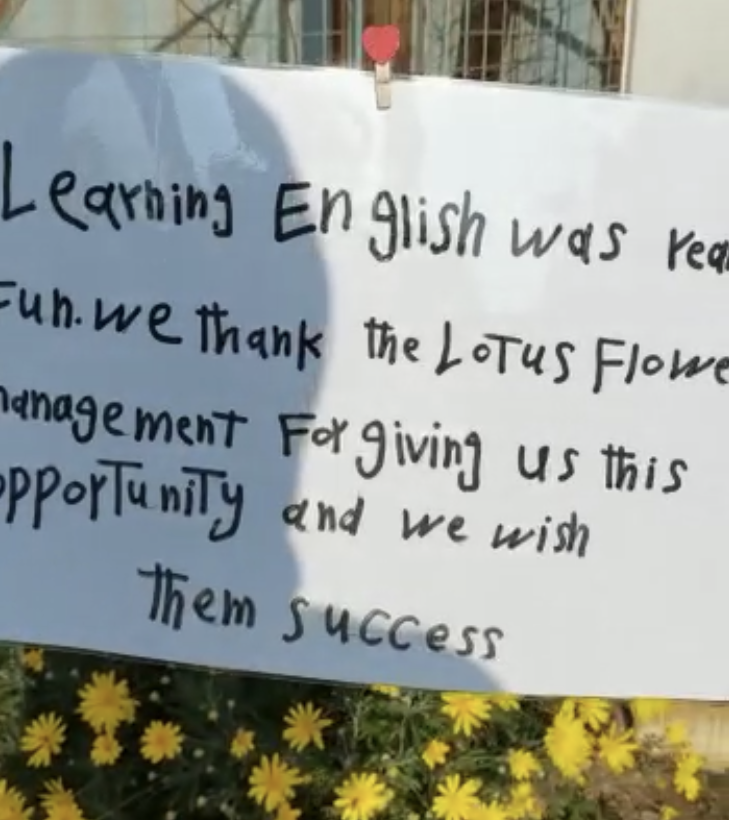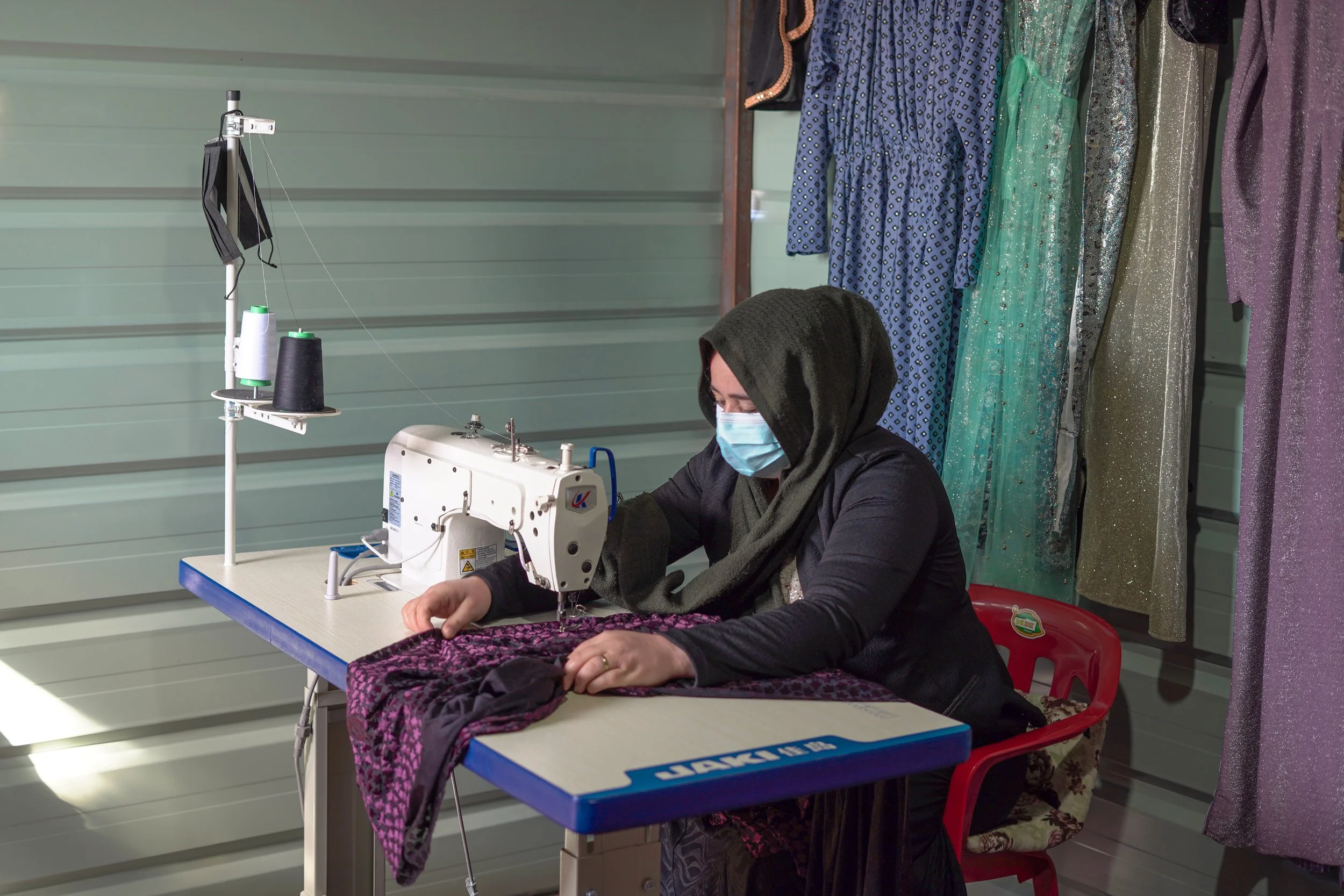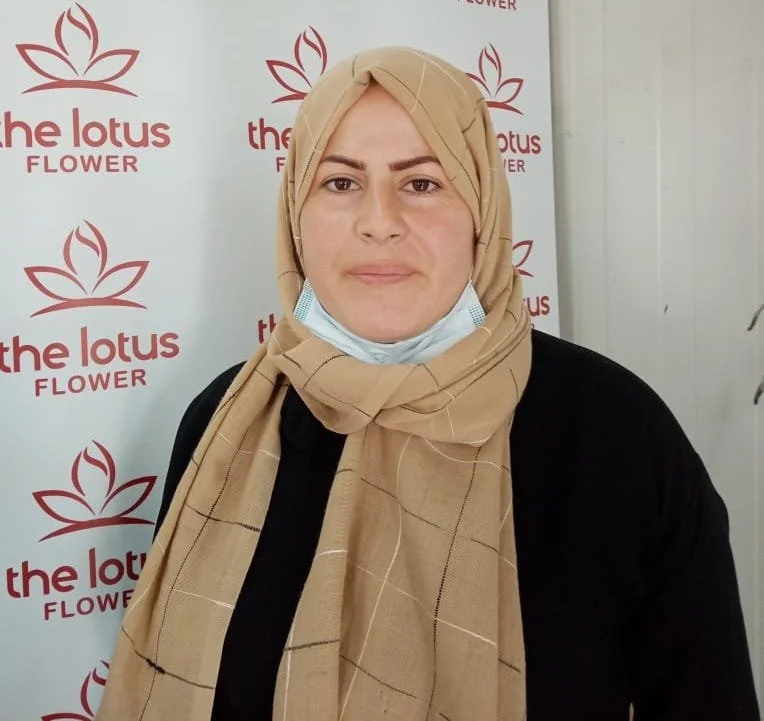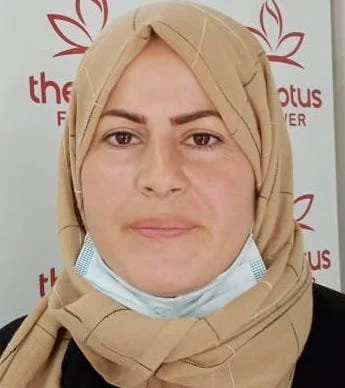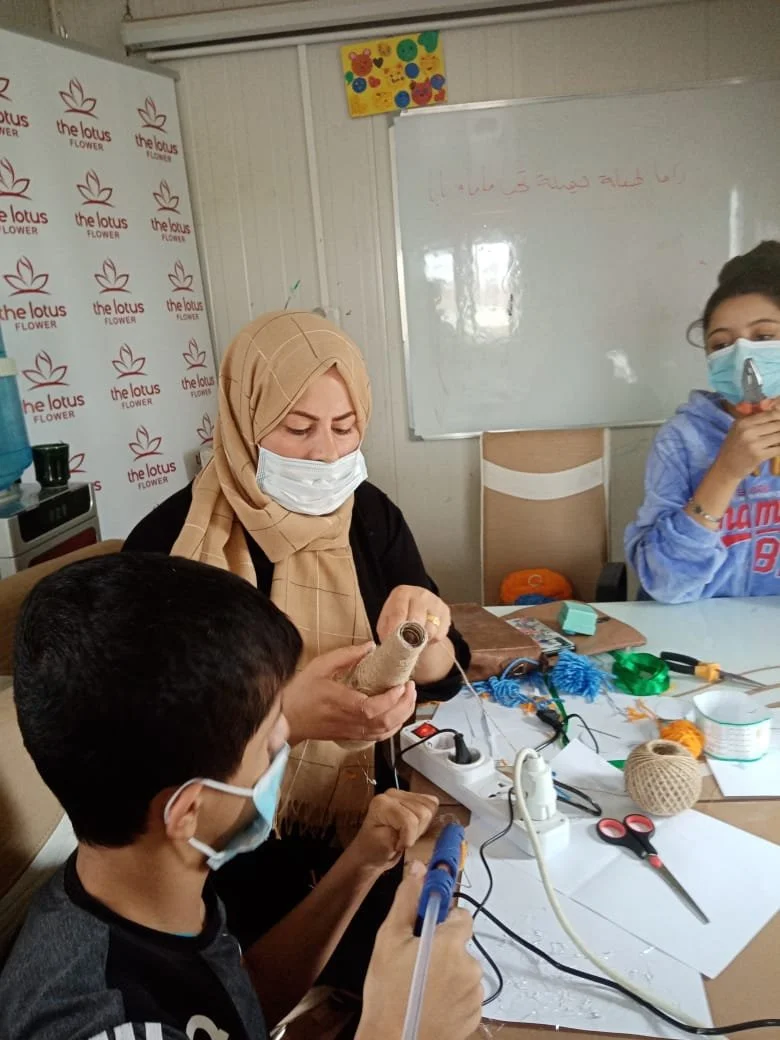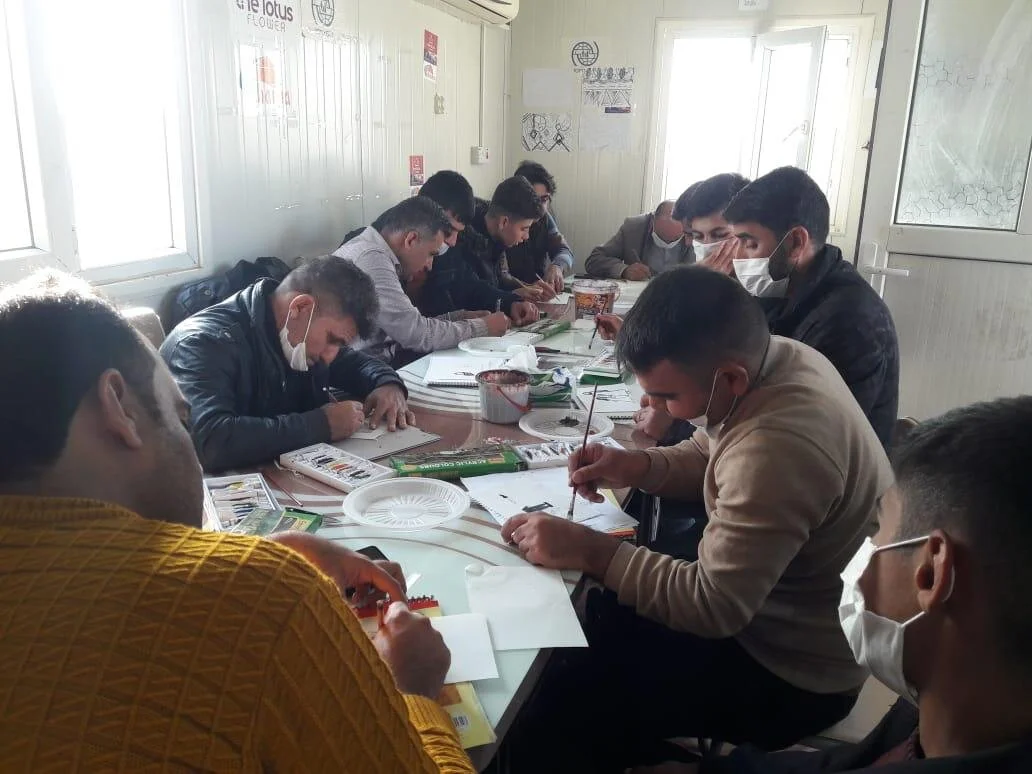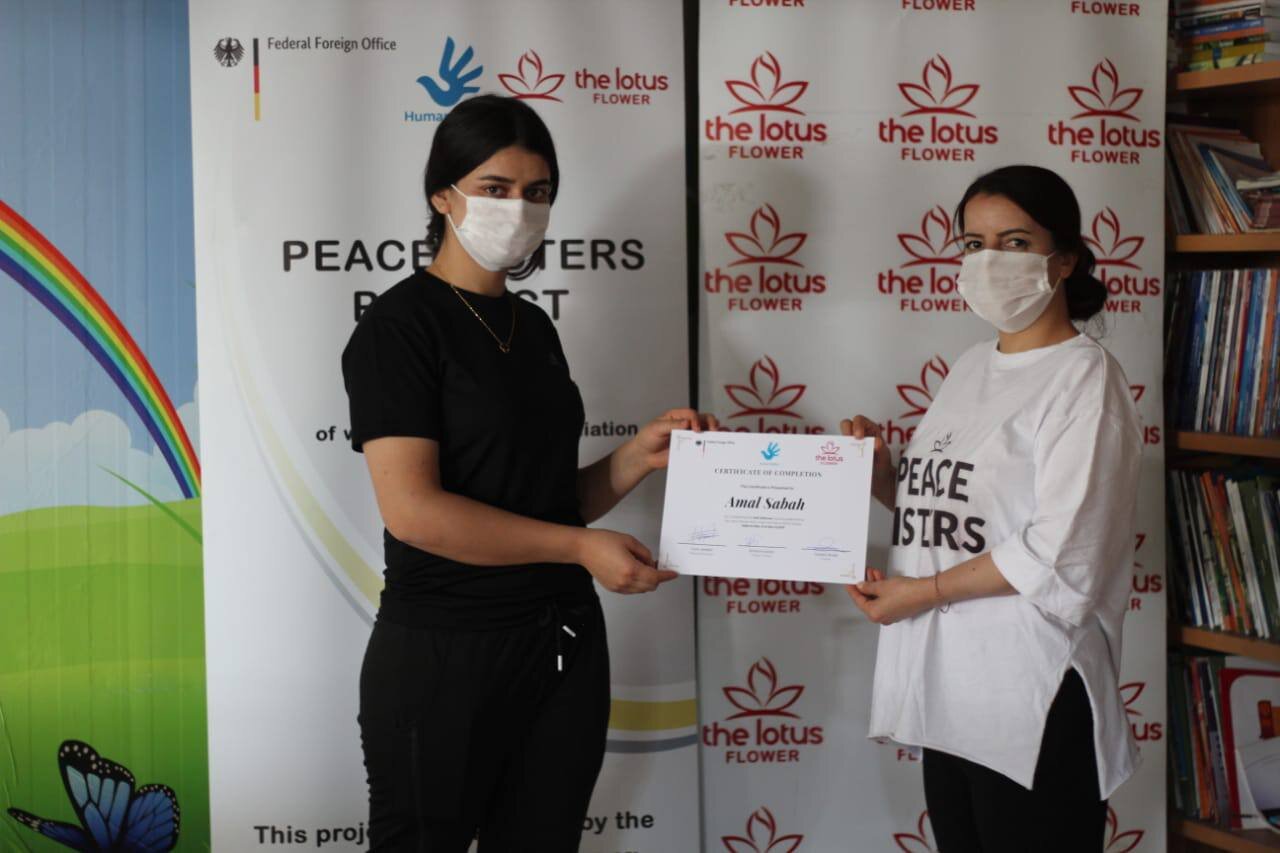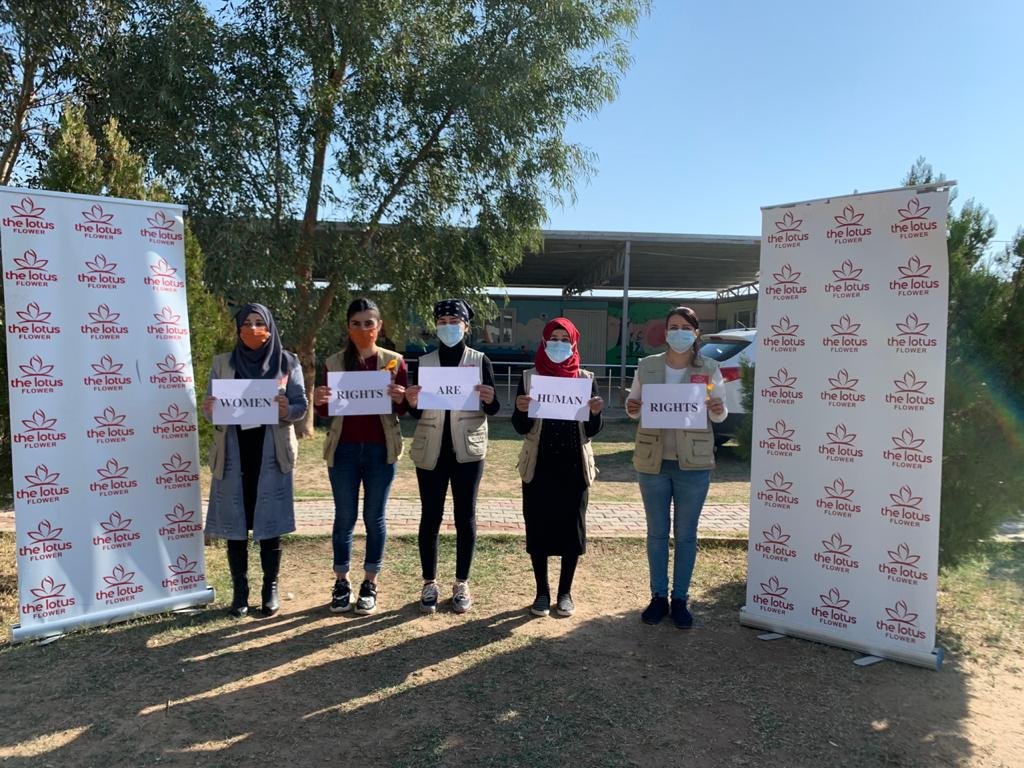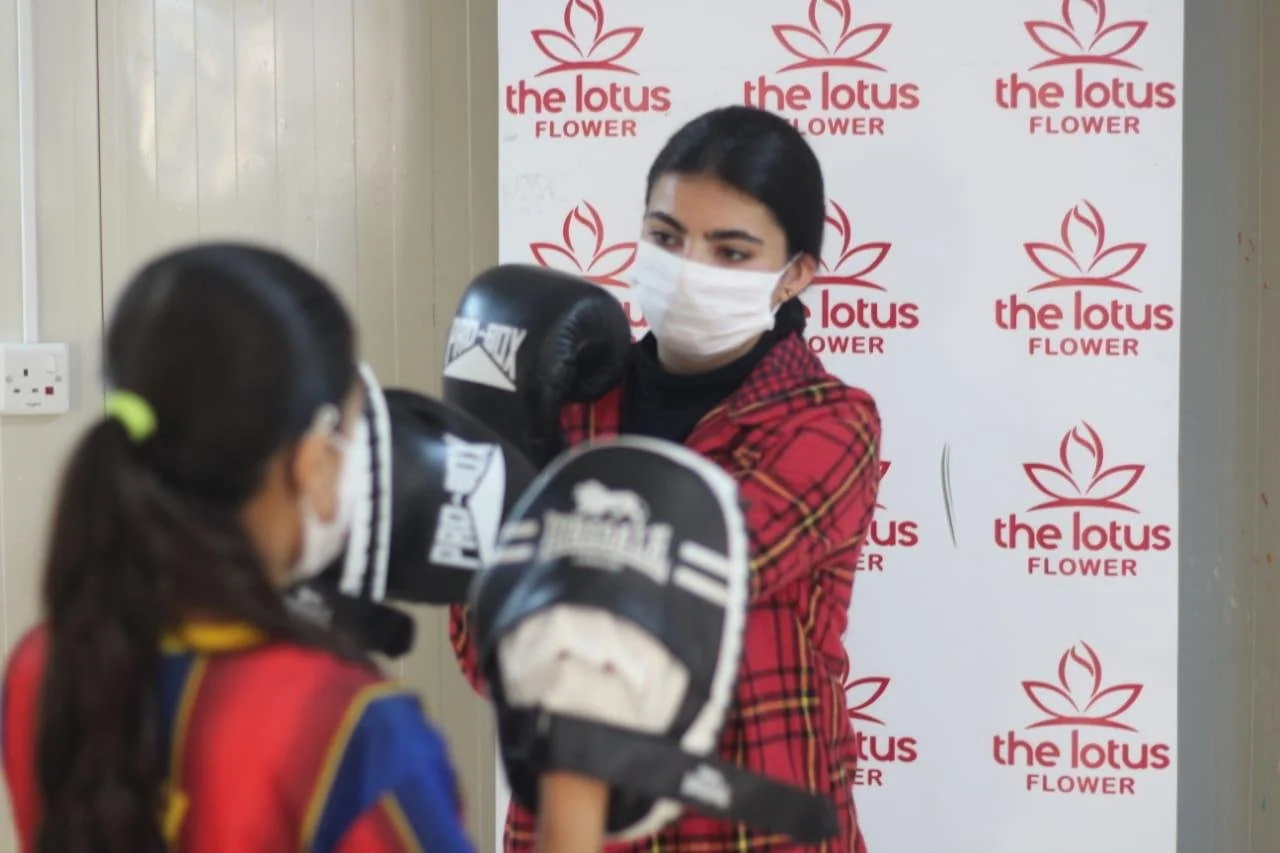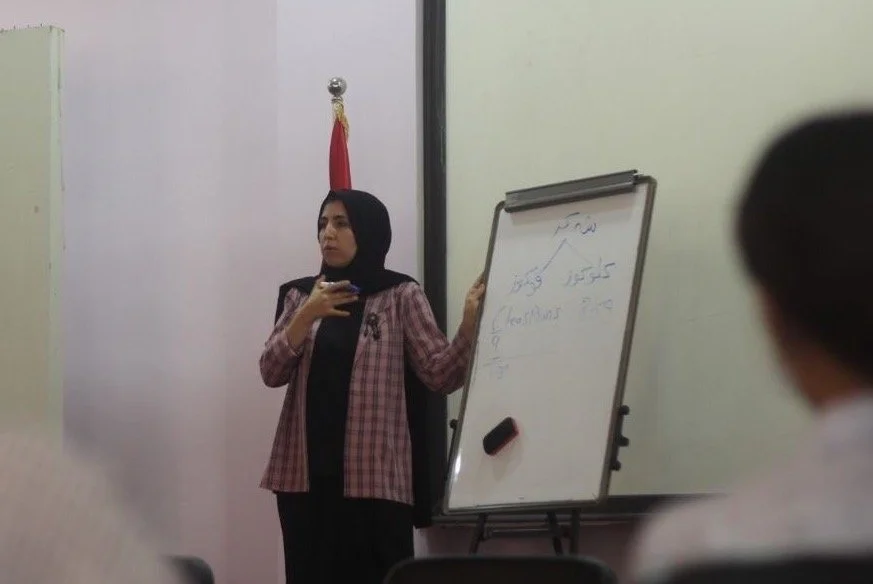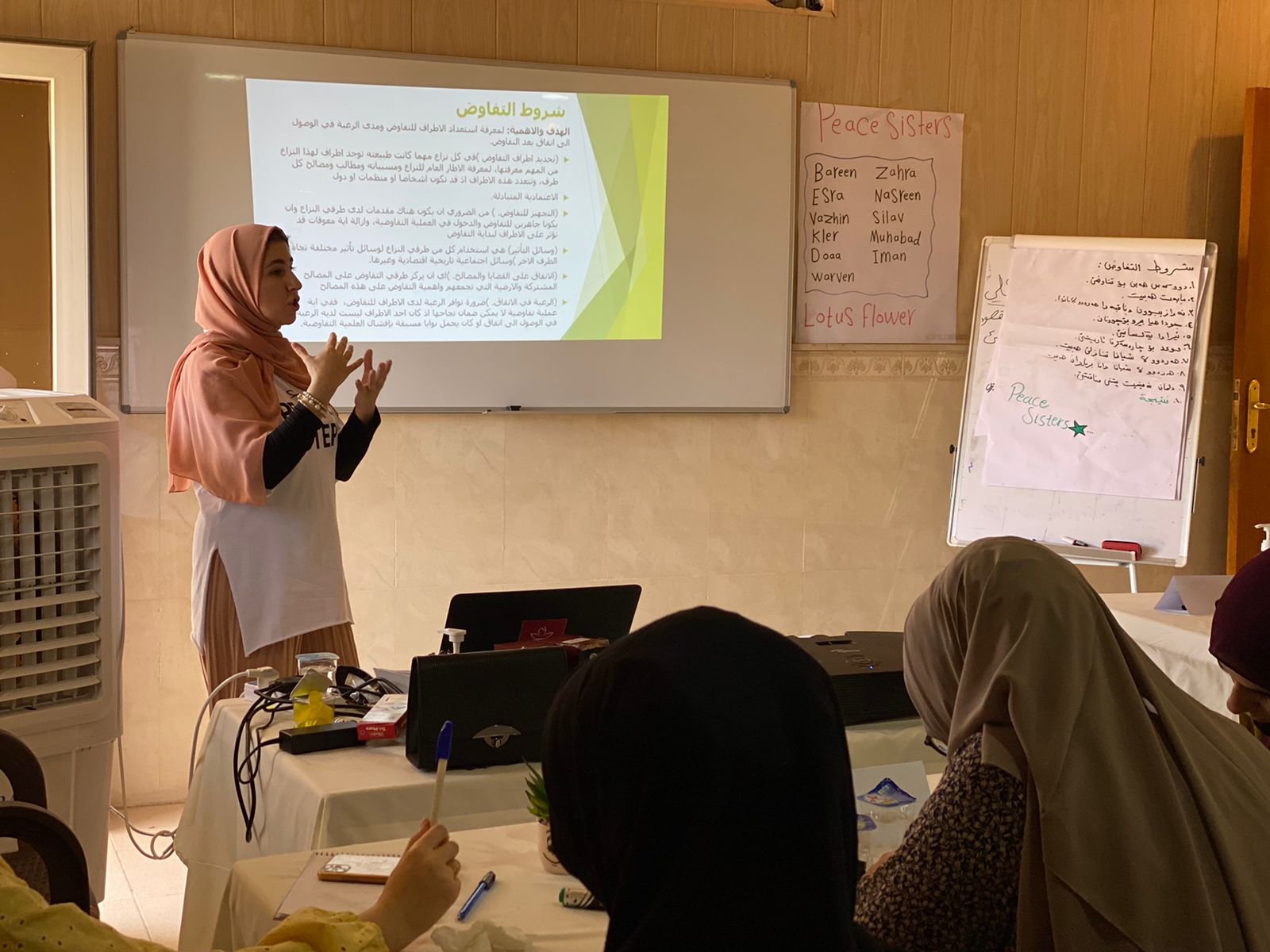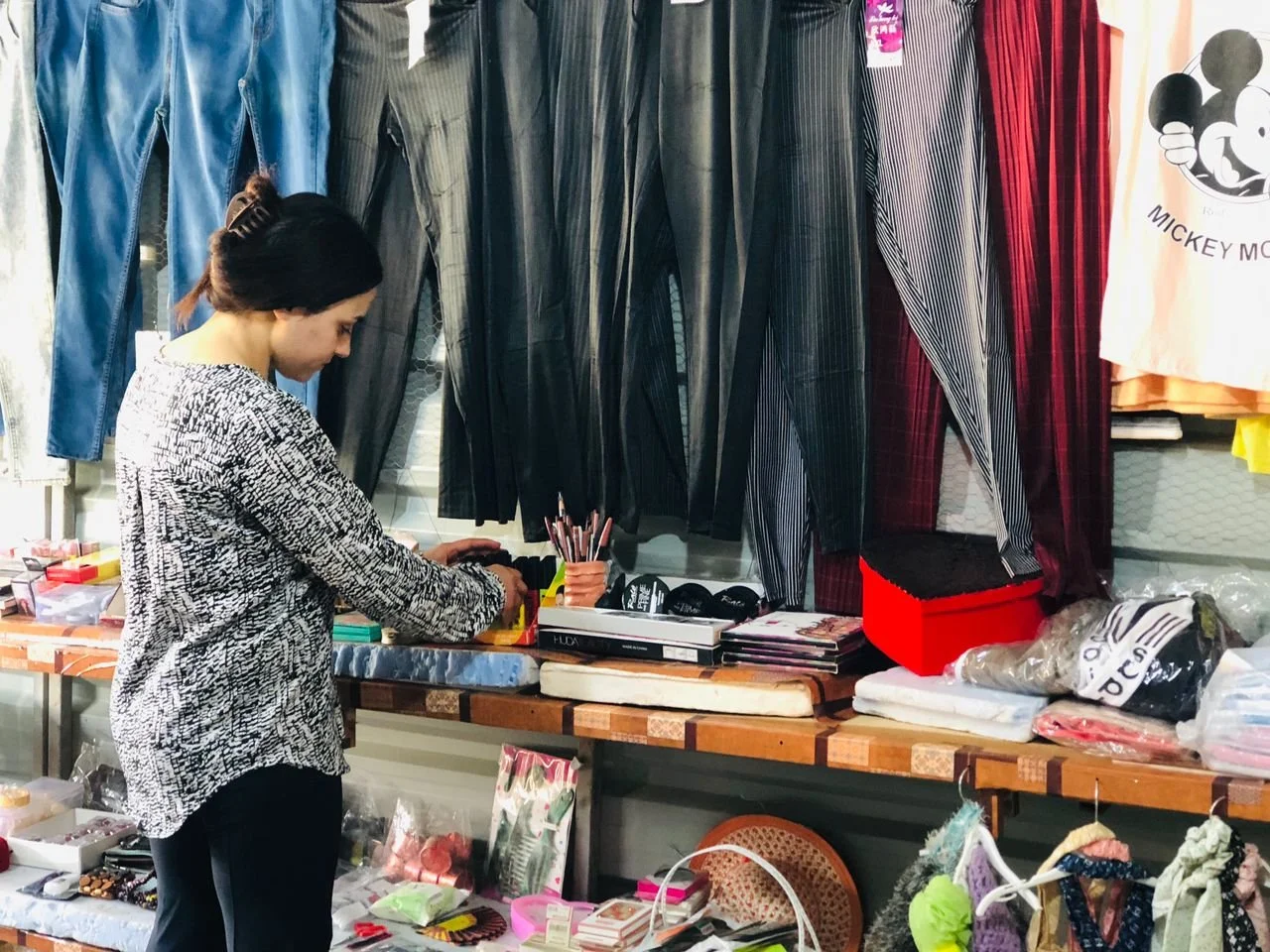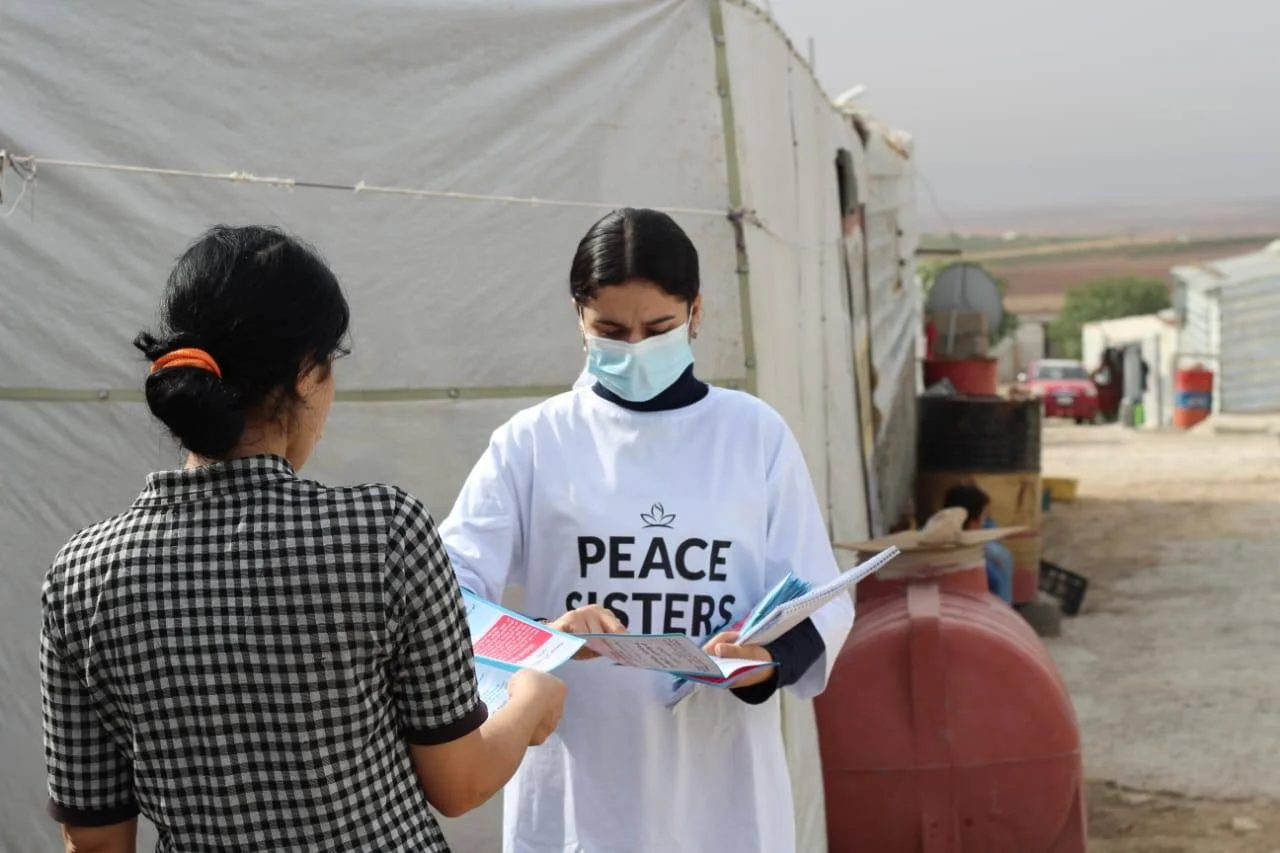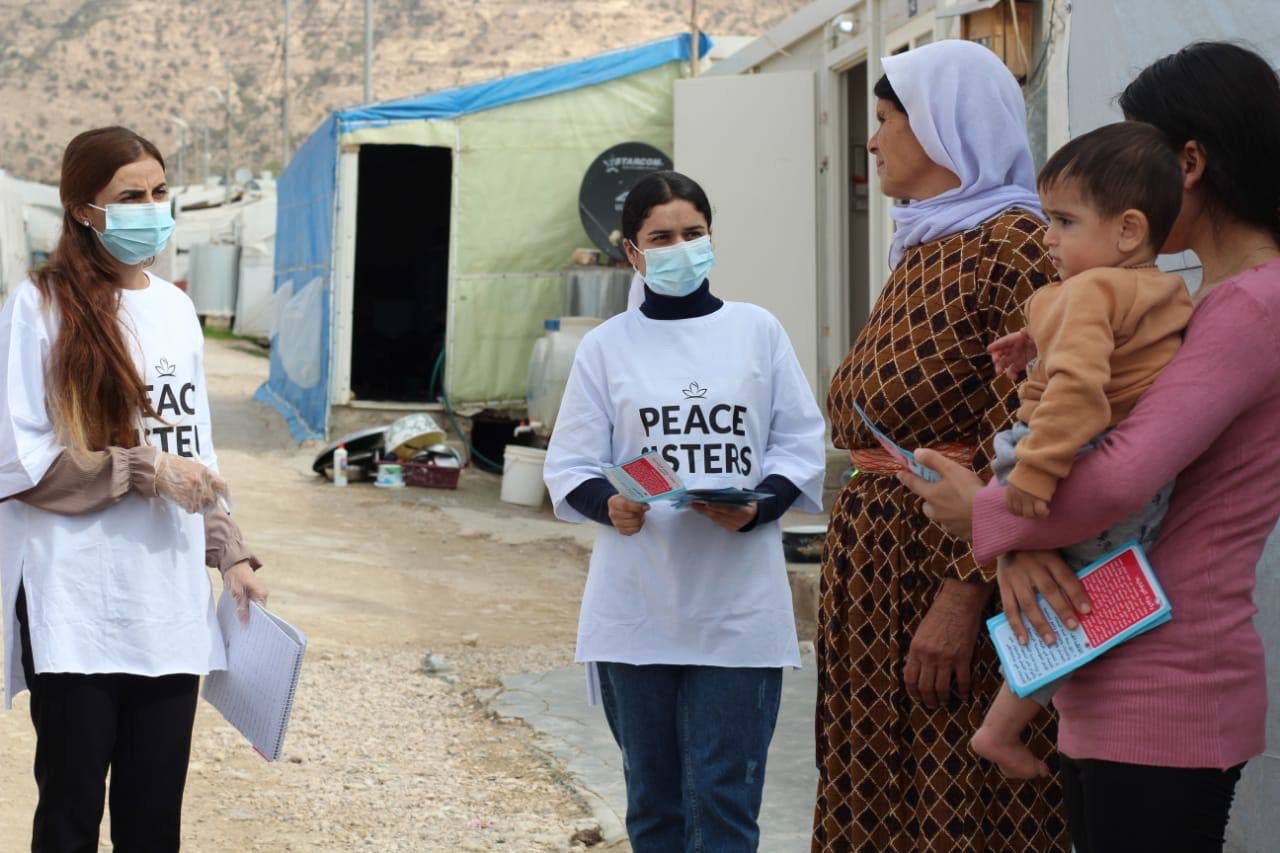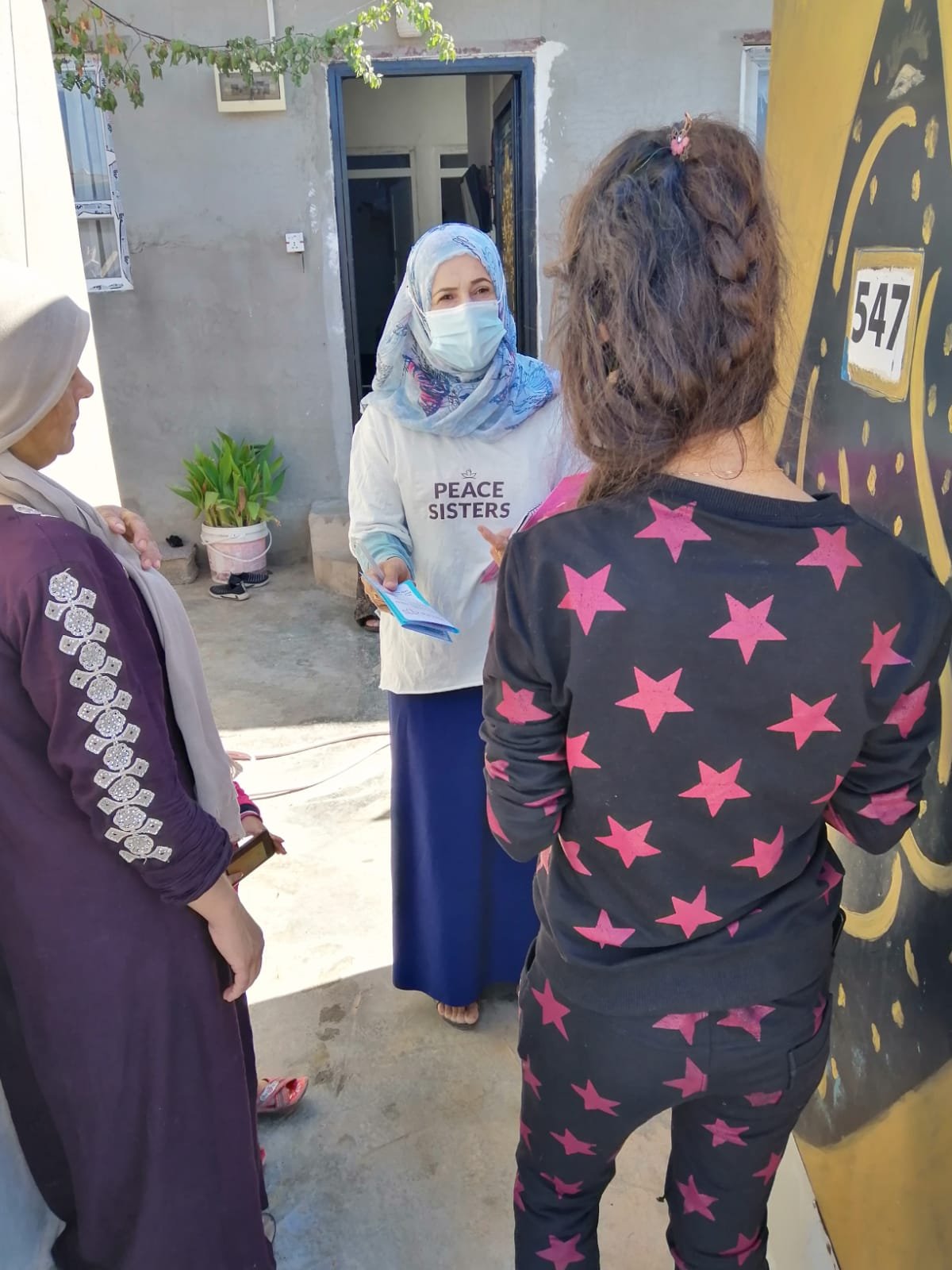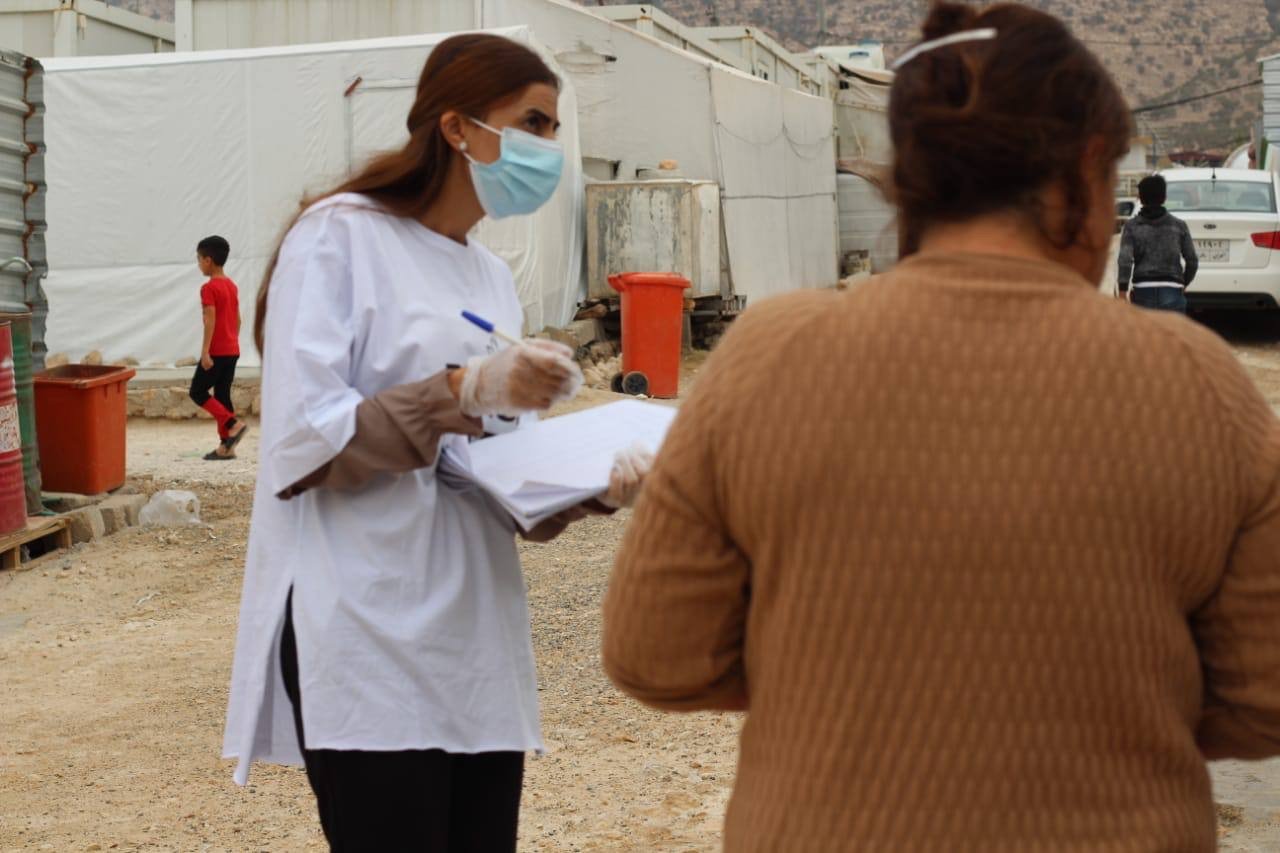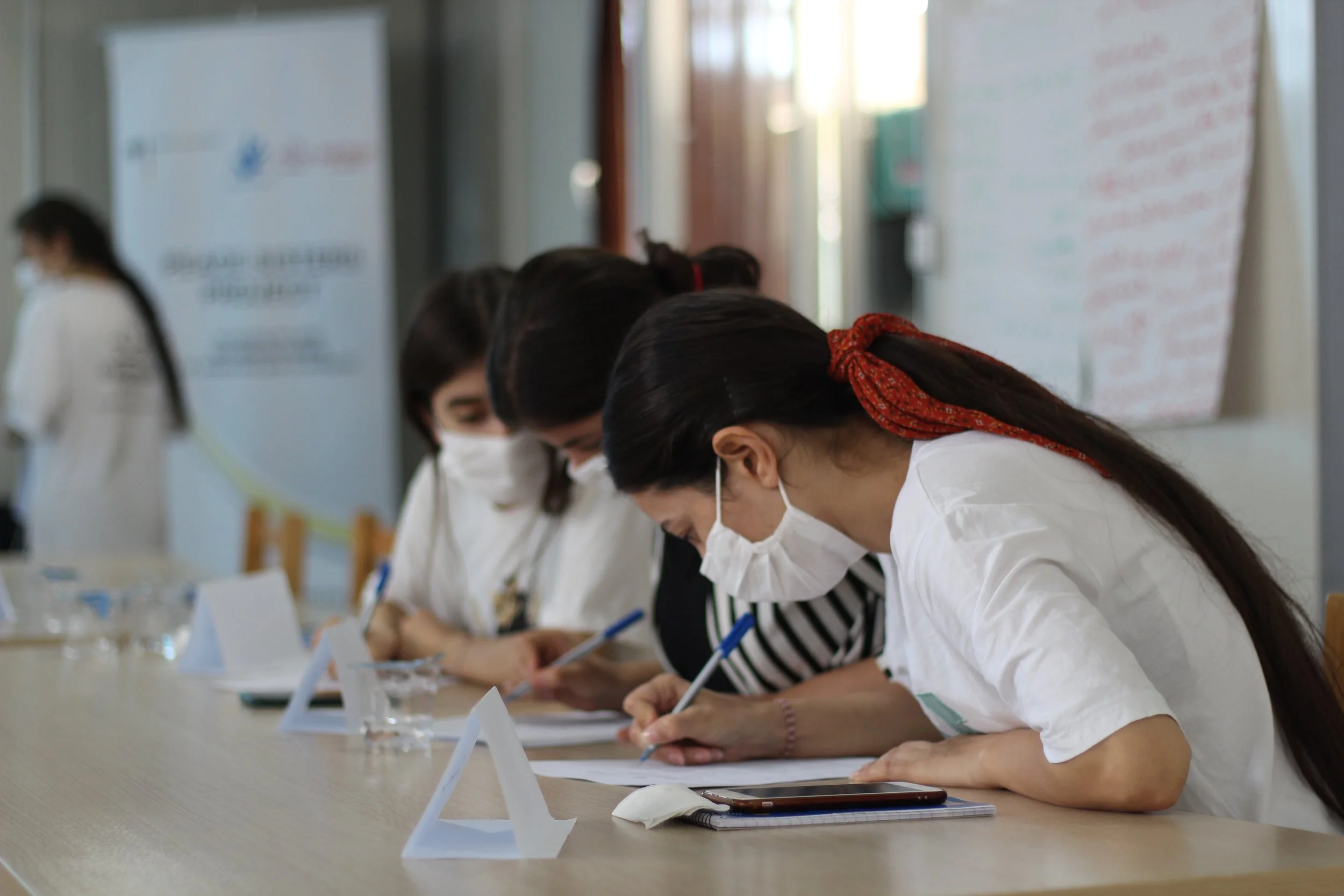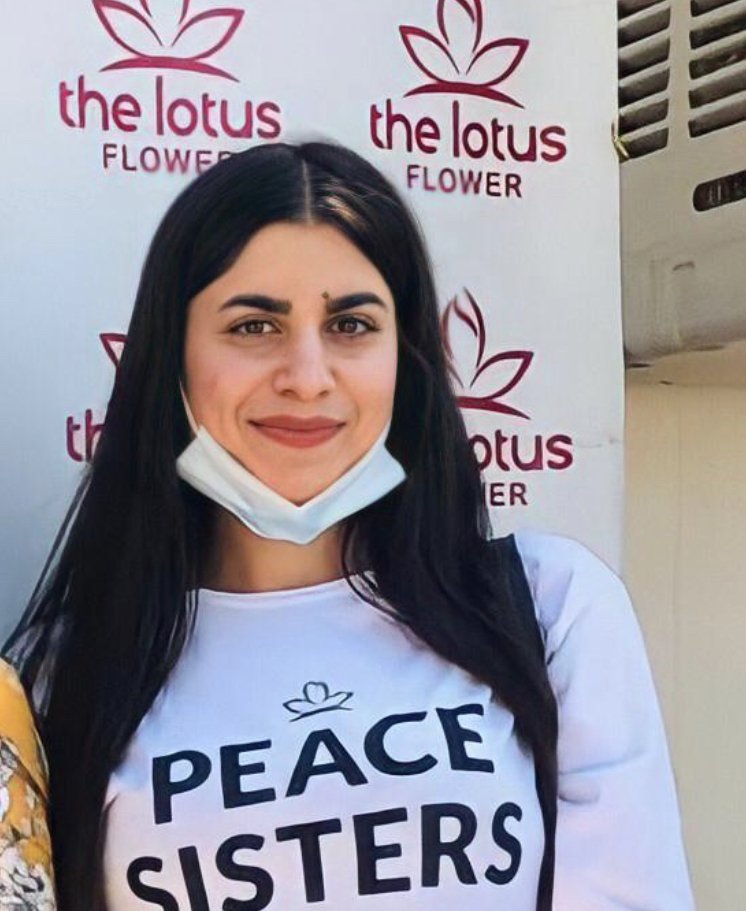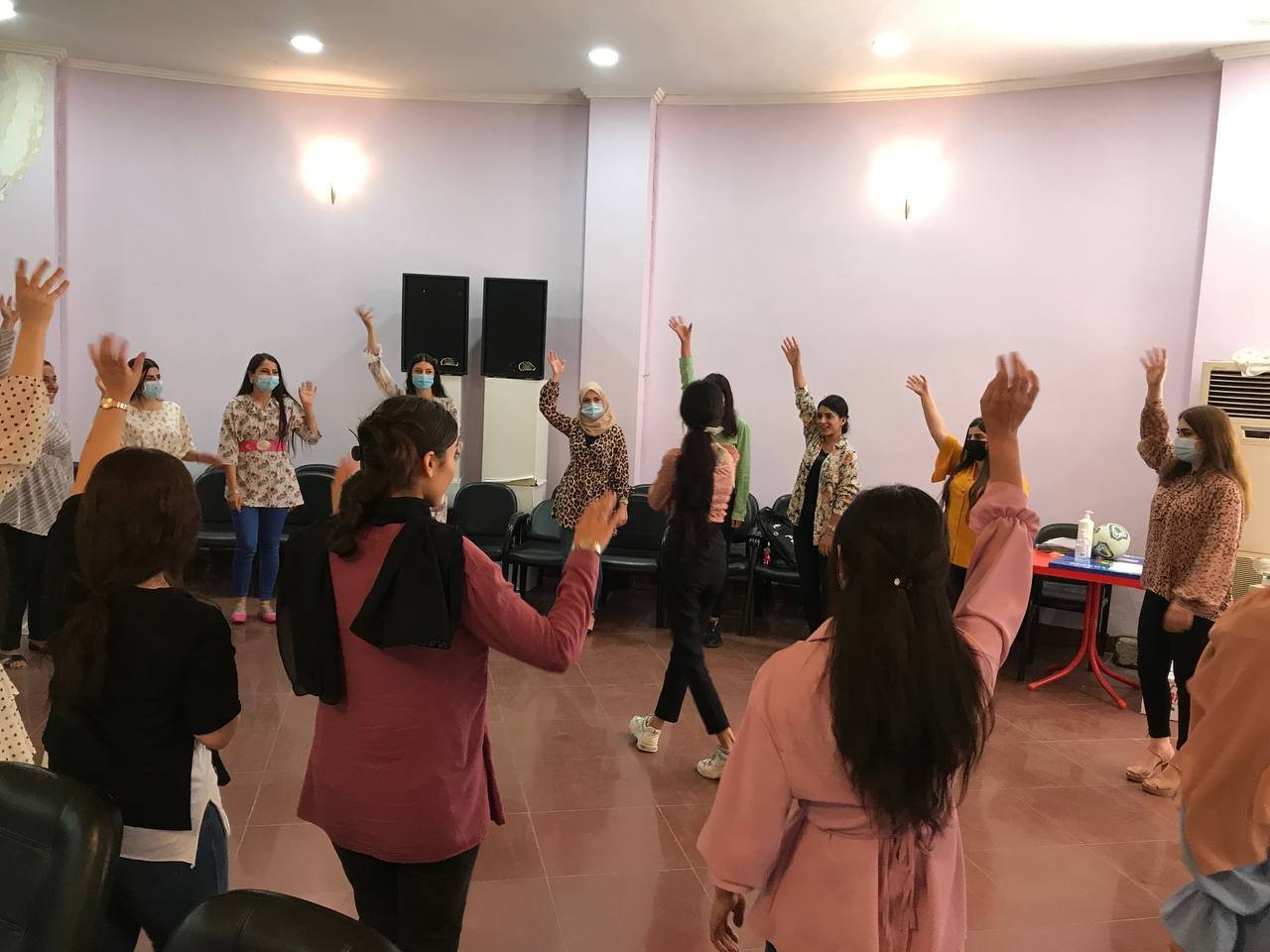Our new Positive Masculinity radio show gets underway
Since last summer, we have been working on one of our biggest projects to date, which is aimed at preventing violence against women and girls.
The project saw us launch our new radio show on Positive Masculinity this week, which is aimed at changing traditional perceptions and attitudes around gender-based violence, focusing on ways that men and boys can support and champion women’s progress and empowerment.
Running for the next six months, the show on Radio Duhok will focus on a different theme around masculinity each week – and the image below shows our Regional Manager Vian launching the first programme in the studio.
Over the coming months, the radio show will feature special guests and local leaders, exploring how perceptions of masculinity impact on the community as a whole – and especially on men and boys. The programmes will complement Positive Masculinity workshops which we’re also holding with men and boys in the community.
These activities are part of our big project with the UN Trust Fund to End Violence against Women, which is the only global grant-making mechanism dedicated to addressing all forms of violence against women and girls at local and national levels.
During our collaboration, we’re working with IDPs and refugees in Zakho and Duhok communities, raising awareness of gender-based violence and supporting victims with mental health and case management services. Other activities include GBV workshops, community awareness sessions and assessments of Covid-19 impact. Additionally, the project is providing support to women-led businesses that have been badly hit by the pandemic.
We’re so pleased to be on this hugely important journey together…
Our winter clothing campaign reaches nearly 700 children
With heavy snow and freezing weather in Kurdistan right now, the Lotus Flower has been busy distributing essential winter clothing to vulnerable children.
We’ve teamed up with Zarok, Operation Hope Australia and the Presbyterian Church in the US, whose kind support means so far we have been able to provide nearly 700 children in IDP camps with warm coats, jackets and shoes for these bitter winter months.
Children living within Essyan, Rwanga and Domiz 2 camps have received the much-needed items, as well as youngsters in Duhok city.
This is the fourth year running that we have been providing winter clothing for children, and with one of the biggest snowfalls in recent years, it is more important than ever that we do all we can to make the conditions more manageable.
As you can imagine, life in camp is even more challenging when the thermometer plummets like this, especially as most families live in basic tents or cabins – often with no heating at all.
For vulnerable communities, the hardships of winter can mean the difference between life and death – and the pandemic has made things so much worse, with critical shortages of food, medicine and other basic supplies.
As you can see from these photos, it’s always such a pleasure to distribute these winter items to the children – and we’re so grateful for the support which allows us to keep doing it…
Sisters' Stories: How education gave Ghazal hope for the future
Our regular ‘Sisters’ Stories’ series focuses on the achievements and often life-changing moments experienced by many of the women and girls we support.
This week, we’d like you to meet Ghazal, a 34-year-old mother from Sinjar. After being displaced across Kurdistan for many years, she arrived in camp in 2019, and like so many other women, found her new life very hard to adapt to.
Knowing few people and with little opportunity available to her or her children, Ghazal felt the future looked bleak for her family. However, she then heard about the Lotus Flower’s programmes, and signed up to several of our classes, including English language, women’s sports and literacy – in which she has learned to read and write for the first time in her life.
“It has been an amazing thing for me,” she says. “Through the Lotus Flower centre I have been able to meet other women and girls and take part in many classes. I especially enjoy learning English language, as it helps me develop and acquire new words and learn about letters.”
These sessions have been especially empowering for Ghazal, as she had no formal education and was illiterate as a child. But with her newly developed skills, she can now ensure her own children have brighter prospects.
“Now I can help my children in school. I can teach them and help them with their homework. My hope is that they will be able to go to university and have the kind of chances that I never had.”
However, Ghazal is also hoping to continue her own educational growth, too. “I want to learn other languages too eventually,” she says.
With continued support and investment in these kinds of educational and livelihoods projects, we believe there’s no reason why Ghazal - and so many other women like her - can’t go on to achieve any of their personal goals…
Sisters' Stories: Our first Peace Sisters celebrate
This week, our regular ‘Sisters’ Stories’ focus is on our fabulous graduate Peace Sisters, who recently completed the groundbreaking nine-month project.
As you can see from the video of the closing ceremony below, the Sisters joined together to commemorate their achievements through music, food and dance, with many wearing traditional costumes to reflect a long history of harmony and social integration.
The ceremony was held to mark the end of the Peace Sisters project, delivered in partnership with the German Consulate in Erbil. During the pilot project, the women and girls were trained in skills around conflict resolution and cooperation, as well as critical thinking and confidence-building, enabling them to become mediators, peace defenders and active community leaders.
During the ceremony, the Peace Sisters sang, danced and shared examples of storytelling through photography, and a tasty lunch was served. Meanwhile, a range of special guests were asked to take part in the wider conversation around living and coexisting together peacefully.
The Peace Sisters themselves greatly enjoyed taking part, as you can see from some of their comments below…
“I am very optimistic about what the Peace Sisters can achieve in society after this training, as it shows how a woman can play an important role in society – especially in bringing justice and peace to the environment we are living in”
“During my time doing Peace Sisters training, I have learned a lot. I loved everything about it, especially that everyone can freely express their opinion and accept each other”
“Being part of this project was so exciting and useful. I got the opportunity to learn, gain new skills as well as do fun activities during the training. Now I know so much more about what mediation is, and how to resolve conflicts and deal with problems”
Because this pioneering project has been so successful, we’re now looking to repeat it again this year. Please do support us so we can make this aim a reality!
Our inaugural Men and Boys' Trauma Project closes with a special ceremony
This week, we brought our very first Men and Boys’ Trauma Project to a fitting end with a ceremony which honoured the 30 participants’ achievements over the past three months.
The men and boys had taken part in activities such as art therapy, English classes, psychological counselling, recreational games and community awareness, enabling them to heal from past trauma together, learn new skills and build their self-confidence.
During the ceremony, they were presented with gifts and certificates to acknowledge their personal growth, while they also performed songs and poems, and displayed their impressive artwork for friends and family to see.
Using their newly acquired skills, many of the 30 participants also wrote their own messages about the project, with one saying, “Learning English was really fun.” Another wrote: “It has been wonderful.”
The project, held at Domiz 2 camp for Syrian refugees, was designed to encourage healing through the sharing of past traumas. It was delivered in partnership with Khaima, whose Executive Director Pfr. Andreas Goerlich joined us for the event, and said: “It’s very touching to see the changes that this project has made to these men and boys. We strongly believe that they are as vulnerable as anyone else and need our assistance.”
Although the Lotus Flower mainly supports women and girls, we know that men and boys have also suffered terribly during years of conflict. Many of the men saw the atrocities committed by IS with their own eyes, and were beaten or threatened themselves. Others saw women being subjected to violence and abuse, and even innocent men being beheaded. Although they locked away their trauma for many years, intense feelings of anger, hurt and fear inevitably built up, which until now they have had no way of articulating or working through.
During the project, the men and boys were able to talk about their feelings in a non-judgmental environment, seek psychosocial support from our mental health team and express their emotions through the power of song, poetry and art.
This groundbreaking project has been incredibly important to us, and with it being so well received by the men and boys, we are now looking to begin another round with our partners soon. Please do support us if you can, as the more money we can raise, the more vulnerable people we can reach this year…
Sisters' Stories: Storytelling Sister Sherin thrives after four years of captivity
Over the past few weeks, our ‘Sisters’ Stories’ series has focused on several women and girls whose stories of courage and bravery continue to make our work so worthwhile.
In our final instalment of the year, we’d like to introduce you to Sherin, a 20-year-old ISIS survivor, whose journey has been unimaginably challenging. During the conflict which began in 2014, she was horrifyingly taken prisoner, and like so many other thousands of young women, taken into a life of servitude. Eventually, after four years, Sherin was ‘sold’ by her captors to a relative living within Rwanga camp in Kurdistan, which finally enabled her to escape her tormentors.
Sherin’s devastating ordeal is hard to comprehend, especially as she was just a teenager at the time. When she arrived at the camp, life remained extremely difficult. “Many other members of my family were still in captivity, and I felt very alone,” she recalls. “I was in shock and suffered from deep depression.”
One by one, Sherin’s family members returned from their time in captivity, but she understandably continued to struggle with the effects of her past trauma. “After hearing that psychosocial support was available at the Lotus Flower centre, I went along, and it really helped me,” she says. “I was treated very well there. I also registered for some of the Lotus Flower courses at the centre, including sports and Storytelling Sisters, where I learned photography skills to document life in camp.”
While taking part in Storytelling Sisters, she and other groups of women and girls learned how to use DLSR cameras and photo editing software, plus how to create video content and use social media platforms to share their work. Thanks to our supporters and project partners, we were able to provide cameras, SD cards and hard drives, and an exhibition was held to showcase their work.
Thankfully, the support Sherin has received left a big impact on her, and she says: “It made me feel that life was much better, and I could finally get involved in the community again.”
Introducing our new project with The Big Heart Foundation and NAMA
It’s been a tough year for everyone, so we are thrilled to announce a major new project with The Big Heart Foundation and NAMA, which will provide much-needed women’s livelihoods and mental health support.
The year-long new partnership, which got underway earlier this month, sees us begin a brand new cycle of our successful Women’s Business Incubator (WBI). It will provide financial support and business mentorship for new and existing women-led small businesses, as well as badly-needed mental health support.
The project is taking place at Essyan, Rwanga and Domiz 2 camps, and will provide financial grants and mentorship for 10 women so that they can each launch a new business of their choosing. Priority will be given to those who are female heads of household, widows with children and ISIS survivors, and each business idea will be based on a proven market need that benefits the whole community. Training will cover the fundamentals needed to start a business, from market research and planning through to launch, effective management, recruitment and networking.
In addition, a further 10 women whose businesses have been badly impacted by Covid-19 will receive financial grants and mentoring so that they can refresh and relaunch their businesses, with a focus on elements such as digital and online marketing, social media for business, crisis management, hygiene training and delivery services.
With the pandemic resulting in escalating mental health issues and a sharp increase in gender-based violence and exploitation in refugee and IDP settings, the project also includes awareness sessions on sexual and gender-based violence (SGBV), plus psycho-social support with a professional psychologist.
Vian Ahmed, our Regional Director, says: “We are thrilled to be working with TBHF and NAMA on the Women’s Business Incubator project, which will enable women to become economically empowered so that they can provide for themselves and their families. The WBI is an innovative, sustainable project which provides the capital and support women need to run successful businesses, learn new skills, achieve financial independence and become primary decision-makers in society.
“The mental health support provided by this project is also essential, as women and girls have been experiencing acute psychological problems during the pandemic, largely due to the loss of jobs and income, as well as increased isolation, rising domestic tensions and GBV.”
We’ll be bringing you more updates about the project here and on our social media over the coming months…
Sisters' Stories: Children with special needs thrive with Hansa’s help
As part of our regular ‘Sisters’ Stories’ series, we enjoy sharing the stories and triumphs of many of the women and girls we support.
Originally from Syria, Hansa is a refugee who arrived at Domiz 2 camp three years ago, along with her husband and son, who has special needs.
While living in Syria, Hansa used to make all kinds of crafts and accessories which she sold to generate an income for her family, and pay for treatment for her young son. After arriving at the camp, she longed for the opportunity to continue those skills, but there were no systems in place to allow her to do so.
Eventually, after hearing about the Lotus Flower centre, she received an opportunity to become a trainer, teaching others how to make simple accessories. Hansa now works specifically with children with special needs in the centre, and says: “Not only can they learn these new skills, but they can also make friends and enjoy some time outside of their houses. The classes make the children feel much more included and better integrated.”
Hansa’s own experiences with her son mean she is very well equipped to teach those with special needs, and she adds: “I know and understand their needs, and can give them the same care and attention that I give my son. I enjoy this work so much, and my son also loves meeting other young people in the group. I’m proud to support refugees with special needs in a safe environment, and will hopefully be able to continue this job for the rest of my life.
“Usually, people with special needs in camps are just stuck at home with little to do. They are often deprived of educational opportunities and other social activities, so these sorts of projects provided by the Lotus Flower make a real difference to their lives.”
Our Storytelling Sisters’ work shines in major global exhibition
We’re always keen to showcase the skills of the women and girls who take part in our projects – not least the incredible talents of our Storytelling Sisters.
Earlier this year, their work was chosen especially for a high-profile Women of the World exhibition in partnership with Google Arts & Culture, called The Hope Brigade. The online exhibition featured 100 trailblazing women from 10 cities and countries around the world, including our Storytelling Sisters in Kurdistan, but also as far afield as Brisbane in Australia.
The exhibition brought together inspiring stories of global feminism and women’s movements under a series of central themes, designed to keep the issue of gender equality at the forefront of debate and discussion.
Our Storytelling Sisters – who have become professionally trained in documenting the everyday through the medium of photo journalism – shared some powerful imagery and stories as part of the exhibition, which each reflected daily life within refugee camps. One of them was this shot of a young woman called Malaka, which was taken by Storytelling Sister Ghazal.
Malaka
Malaka herself had the chance to join our Baking Sisters project, enabling her to make cakes to help provide an income for herself and family. “The Lotus Flower provided funds to kickstart the Baking Sisters business, a bakery near the entrance of Rwanga camp, where I live," she said. "I am able to provide for my daughter. I buy whatever she needs.”
Ghazal also captured this image of Nadifa, who has been teaching boxing skills at our women’s centre. She said: "Even when women have no weapons with them, they can save themselves from the bad guys. Many of my students said that they were getting better mentally after being trained.”
Nadifa
Another of the chosen photos features Layla, who herself is one of the Storytelling Sisters. “I feel like this is a big part of my identity, and I am able to express myself through photos and words,” she said. “I took this picture of my father sometime last year, and he has recently passed away. I’m grieving a lot. He was a really important part of me, so this picture is one of my most prized possessions.”
Layla
Layla also took this image of Hiba, who has been studying hard to reach her goals – and finished top of her class with an average score of 99.88. "My dream is to study medicine, and hopefully I will treat sick people and the poor and people in need,” she said.
Hiba
This is just a small selection of images from the exhibition, so please do check out more pictures and the full stories here…
A close-up on our 16 Days Of Activism campaign activities
It’s one of the most significant times of year for all those working to end violence against women, so our 16 Days of Activism campaign has been keeping us very busy!
We launched this emergency appeal last week to raise badly-need funds so we can continue supporting women and girls through what the UN has called a ‘shadow pandemic’ of violence. Vulnerable refugees and IDP populations have been left especially at risk of violent acts and sexual assault during Covid-19, with lockdowns leaving many women and girls unable to shield themselves from abuse, as well as cut adrift from essential support mechanisms.
As well as raising money for our cause, we’ve been running a major awareness campaign within the camps where we work. This has included all kinds of sessions aimed at eliminating GBV – with topics including financial violence, plus emotional and mental abuse.
And as part of our men and boys’ trauma project, an all-male group joined together for a day of debate around the prevention of gender-based violence. As well as discussing ways of reducing GBV against women, they used art and painting skills to express themselves, and learned English words to understand more about the different types of violence. The group also enjoyed music sessions as part of their collaborative efforts.
In addition to raising awareness and focusing on the more serious discussions, we’ve been celebrating many courageous women and girls who have gone to extraordinary lengths to support and empower other females around them. Meanwhile, our Peace Sisters have also been teaching women self-defence and boxing skills. Alongside specialist trainers, the sessions have been taking place at Rwanga camp and in our women’s centre in Duhok city, with those participating receiving certificates at the end.
This campaign has been incredibly productive and rewarding for everyone involved so far – and what’s more, there’s still plenty of time for you to support us!
Do hit the button below and donate to our urgent cause if you can…
16 Days of Activism: Back our urgent new appeal
Each year, the global 16 Days of Activism campaign unites organisations and individuals around the world who are working to prevent and eliminate all forms of violence against women and girls.
This year, to mark the 30th anniversary of the campaign, the Lotus Flower desperately needs your help. As you may be aware, Covid-19 has sparked rising cases of violence and sexual assault against women, and even widespread loss of life. This has been especially evident amongst vulnerable refugees and IDP populations, where lockdowns have left many women and girls unable to shield themselves from their abusers, as well as cut adrift from essential support mechanisms.
With your support, we are looking to raise as much as we can over the course of 16 Days of Activism. Money donated to our cause will help fund our work in preventing and eradicating the devastating tide of violence and discrimination faced by women and girls on a daily basis.
Reducing and stopping gender-based violence lies at the heart of all we do, filtering into every single project and awareness programme. But while displaced women and girls have been suffering what the UN calls a ‘shadow pandemic’ of violence, the amount of help available to victims has been decimated. As we have found, many donors have cancelled agreed funding commitments, resulting in a critical shortfall of specialist services, mental health support and case referrals for survivors.
The lack of funds and resources also threatens our survival as a charity. This is why we are calling on you today to donate whatever you can to help us. Even a few pounds will help secure our projects and programmes into next year and beyond.
Ever since its inception in 1991, 16 Days of Activism begins each year on 25 November, on International Day for the Elimination of Violence against Women. The campaign runs until 10 December, which is formally known as Human Rights Day.
This campaign is hugely important for us. We rarely reach out in such a direct way for financial support, but as an organisation we need to do more to counter the effects of repeated lockdowns, curfews and job losses – all of which have impacted most severely on women and girls. Recent reports in Iraq have shown an alarming increase in GBV cases during the pandemic, in particular of domestic violence. And given that Iraqi women and children - especially those with disabilities - were already at significant risk of violence pre-pandemic, these figures are the mere tip of the iceberg.
To help us make a difference, please donate whatever you can using the button below and share this post with friends and loved ones.
We believe that a world without violence against women and girls is possible, but we all need to work together to make it a reality. Thank you so very much for your support.
Sisters' Stories: How boxing has helped 16-year-old Rushna
For our ‘Sisters’ Stories’ series, we love sharing some of the very different stories, backgrounds and successes of the women and girls we support.
Rushna is one of our younger beneficiaries, aged just 16. She originally comes from the Sinjar area, but has lived in the Rwanga camp for seven years after arriving with her family following the ISIS attacks of 2014.
Living in cramped camp accommodation and going without many of the usual opportunities that childhood brings, Rushna’s journey has certainly not been easy. But she has not let that get in the way of her ambitions to learn and grow.
She has thrown herself into many of the projects we provide, including English language lessons and our Peace Sisters initiative – in which she has developed new skills in mediation and conflict resolution, as well as critical thinking and communications.
Rushna has also found our regular girls’ boxing classes to be hugely beneficial – for both her mental and physical wellbeing. “I really enjoy boxing because it makes me feel strong,” she says. “I hope one day to be a boxing trainer myself, so I can teach other women and girls to defend themselves. It’s not all about physical strength, but it also gives you a strong sense of self-confidence and self-determination to face the difficulties in our lives. I want to share that with other young girls.”
Our boxing classes are the result of our hugely popular Boxing Sisters project, which recognised that boxing is a great form of stress relief. We also noticed that it helped participants with anger management, enabling trauma to move through the body before being released from the muscles.
Rushna has also found socialising at our women and girls’ centre very helpful. “It gives me opportunities to learn new skills and meet new friends, so we can spend time together instead of being stuck in our accommodation.”
It’s always incredibly rewarding to hear about the positive impacts of our projects, so please do support us so we can keep making a difference to many more young women and girls’ lives…
The harrowing moments that first inspired the Lotus Flower
If you’ve just stumbled across our website for the first time – welcome! Even if you’ve been here a few times before, perhaps you’re not entirely familiar with our story, or how the Lotus Flower first came to be. So we thought we’d use this opportunity to share our backstory in a little more detail.
You may have seen us mention our founder Taban Shoresh many times on social media, or perhaps you’ve come across her story elsewhere. But frankly, her remarkable journey is the reason we exist today, and as the Telegraph newspaper once commented, it has all the echoes of a blockbuster movie…
“Taban’s story reads like an action thriller. Secret police, escape from certain death, poison, travelling via underground networks, crossing international borders on horseback at the dead of night. It’s all here. There’s a book in here somewhere, a film too, even.”
Taban is a former child genocide survivor, who grew up under Saddam Hussein’s regime in Iraq. She was imprisoned with her family aged just four, and they narrowly escaped being buried alive. After 12 months dodging mines, bombs and incessant gunfire, they finally arrived in Iran and were flown to the UK by Amnesty International to start a new life.
Pic source: BBC News
After a relatively normal childhood, Taban later worked in the City of London, but in April 2014, everything changed. As she saw ISIS waging another genocide in her homeland, she returned to Kurdistan as an aid worker – and within two days was up in a helicopter delivering provisions to displaced Yezidis trapped on Mount Sinjar.
These clips of BBC footage from her mission are just as chilling today as they were all those years ago:
Fifteen months later, Taban returned to the UK, knowing in her heart that she had to do more to help women and girl IDPs and refugees. So in March 2016, she launched the Lotus Flower, starting with a few Post-It notes and a pen on the floor of her living room. The charity began with a few simple, small projects which have since blossomed into a fully-fledged programme with around different 40 activities, involving nearly 30 staff. Today, we have three centres for women and girls within Rwanga, Essyan and Domiz 2 camps, as well as our new facility in Duhok city.
It’s been a traumatic and at times near-impossible journey for Taban, but without her determination and courage, we would never have been able to reach the 40,000 women, girls and community members who we’ve supported so far.
As we edge towards the end of another busy year, we’re all looking forward to the next chapter!
Sisters' Stories: Iman’s journey to self-confidence and new opportunity
Every week, our ‘Sisters’ Stories’ series shines a spotlight on one extraordinary woman who we support through our range of on-the-ground projects.
The latest inspirational woman to tell you about is Iman, who comes from Duhok. She first got involved with the Lotus Flower earlier this year when a friend encouraged her to take part in our inaugural Peace Sisters project.
As part of this groundbreaking programme, 50 women and girls are learning skills in peacebuilding, mediation and conflict resolution, in order to help restore harmony across fractured communities. After attending seven Peace Sisters training sessions, Iman got the chance to help lead the workshops for other community members – an experience she found hugely rewarding.
“I have learned so much by taking part in this project, and it has helped me interact and socialise with lots of people from different religions and social backgrounds,” says Iman. “I also developed the ability to express my opinions in class – even though that has always seemed scary before. I also got rid of the fear of being on stage and giving presentations, which gave me more confidence in myself.”
The Peace Sisters project, in partnership with the German Consulate in Erbil, includes skills in leadership, critical thinking and communications, as well as negotiation and integration, plus self-esteem issues and social rehabilitation. One of the first known schemes to focus on women becoming mediators and active community leaders in this way, it targets men and women in camps and host communities, as well as religious leaders, civil society organisations and NGO representatives.
Iman adds: “Above all, I had a lot of fun doing this project, and it showed me how bringing change must start with ourselves. I hope the Lotus Flower continues doing activities and projects like this to help others develop their skills, and share in such a positive atmosphere.”
For Iman, the skills she learned through Peace Sisters has led to an exciting new chapter, as she is now working as an English teacher on our Men and Boys Trauma project. As part of this programme, we are working with Khaima to support 30 men and boys through activities such as psychological counselling, art therapy and recreational activities, as well as the English classes which Iman is proudly delivering.
Now that’s a story of personal growth we can all aspire to…
Sisters Stories: Hussna’s small business goes from strength to strength
Each week, our ‘Sisters’ Stories’ series celebrates some of the women we support, recognising their incredible achievements in the communities where we work.
This week, we introduce you to Hussna, a 23-year-old conflict survivor who sadly has no parents or siblings. Before the ISIS invasion of 2014, she lived in a small house with her grandparents, but during the atrocities they were forced to flee, and came to Essyan camp in Kurdistan as refugees in 2015.
Hussna recalls: “In the beginning, it was very difficult because we didn’t know anyone. We had no friends, no relatives and no income. That meant we were totally dependent on support services and donations, and it badly affected my psychological health.”
After struggling for many months, she later heard about the Lotus Flower’s women’s centre at Essyan, and was encouraged to seek mental health support from one of our psychologists. She also took up the opportunity to join therapeutic and educational classes at our centre, including our Storytelling Sisters project – which teaches women and girls the power of imagery and how to document their everyday lives through the medium of photo journalism.
“I also took up handcrafting and basketball, which I’ve enjoyed a lot,” Hussna adds. “All of these activities have really helped my mental health and allowed me to become stronger while coping with life in a small tent with my grandparents.”
Even more life-changing was the moment she was selected to take part in our Women’s Business Incubator project last year. After receiving intensive business training, a start-up grant and mentorship, she was able to open her own shop, which sells clothing and accessories for children and women in the community.
So far, it has proved a real success, and she says: “It means I now earn income for me and my family, so I can provide food and clothing for my grandparents. One day I hope I can pursue an education too, so that I become more skilled and am able to expand my business further and employ other people.”
After all she has been through, we’re sure you’ll agree that Hussna’s determination to keep going and carve out a prosperous future for herself and her family is incredibly inspiring…
Peace Sisters campaign marks 21 years of Resolution 1325
To mark the 21st anniversary of the UN’s landmark Resolution 1325, our Peace Sisters have been rolling out a vital new awareness campaign on Women, Peace and Security (WPS).
Over 10 days, six of the Peace Sisters are visiting three local camps to reinforce the need to greatly increase women’s participation in peacebuilding and conflict resolution. Despite the Resolution being passed more than 20 years ago, there has been global reticence in implementing the principles of Women, Peace and Security, and much more action is required across the world to address the gendered impact of conflict and to reaffirm the rights of women and girls.
As a result of this need, the Peace Sisters have been handing out leaflets and talking to hundreds of individuals at Rwanga, Essyan and Domiz 2 camps, in order to explain Resolution 1325 and its continued importance more than two decades after implementation. As well as reaching women and girls, the campaign is also targeting men and boys, as they must play a part in all processes to improve women’s participation in peace and security efforts.
First passed in October 2020, Resolution 1325 called for women to be involved in the prevention and resolution of conflicts, peace negotiations, peacekeeping, humanitarian response and community rebuilding. It also urged all parties to take special measures to protect women and girls from gender-based violence, particularly rape and other forms of sexual abuse, in situations of armed conflict.
This awareness campaign is the latest activity in our dynamic Peace Sisters project, which is training 50 women and girls to be mediators and peace defenders in their own communities. In cooperation with the German Consulate in Erbil, the initiative encourages inclusion, collaboration and open dialogue across multiple faiths, cultures and generations, and it incorporates skills in critical thinking, teamwork and public speaking, so that women and girls are inspired to take on more effective leadership roles.
The moment we won the iValues award for Economy & Jobs
One of the projects we are most proud of at the Lotus Flower is our Women’s Business Incubator - and this week, we won a prestigious award recognising its importance and success.
The Incubator is a livelihoods project which provides training, funding and literacy support so that vulnerable women ISIS survivors can start their own small businesses and earn a living to provide for their own families - often for the first time in their lives.
During a ceremony in Amman, Jordan, our Regional Director Vian Ahmed accepted the iValues award for Economy & Jobs, courtesy of the the Friedrich Naumann Foundation for Freedom (FNF) in the MENA region.
The project has seen women launch all kinds of sustainable businesses, including hair and beauty salons, clothing stores, cafes and snack-shops. Our Incubator covers all the fundamentals they need to start a business, from market research and planning through to launch, plus effective management, recruitment and networking. It also focuses on business development which is robust during these times of the pandemic, by incorporating marketing skills, crisis management, social media for business and delivery services.
The project also includes mental health support, which is much-needed in the wake of COVID-19, especially as cases of gender-based violence have soared. By gaining educational skills, financial independence and becoming primary decision-makers, the Incubator is actually designed to help combat such patterns of violence against women.
Furthermore, by accessing our other educational programs, including English language and literacy classes, women build their confidence, skills, and social networks, contributing to a higher likelihood of success. Any profits their business earns are paid directly to them, to support their families and re-invest.
We’re really keen to extend the project further so it can provide many more women with the tools they need to secure their financial independence. So please do support us if you can…
Women in Foreign Policy: A spotlight on our new Peace Sister Amsha
The Lotus Flower’s innovative Peace Sisters project recently caught the eye of Women in Foreign Policy – a leading global platform than champions young female changemakers and brings relatable role models to the fore.
Women in Foreign Policy’s mission is for women all over the world to have a seat at the table and a real future in decision-making processes, and the team accordingly chose to feature one of our new Peace Sisters in its recent newsletter.
In the well-received article, the spotlight was turned on Amsha, a 21-year ISIS survivor who fled her home with her family during the 2014 conflict – and then experienced even more trauma when her sister went into labour on Mount Sinjar. The family eventually reached safety across the Syrian border, from where they travelled to Essyan camp for IDPs in Kurdistan.
It was here that Amsha got involved with the Lotus Flower, and she is now one of our first trained Peace Sisters. In this pioneering project – in conjunction with the German Consulate in Erbil – 50 young women have been taking part in training in mediation and conflict resolution, as well as skills in critical thinking, teamwork and communications.
As one of the first known initiatives that focuses on women becoming mediators, defenders and community leaders in this way, the project activities are designed to encourage inclusion, collaboration and dialogue across multiple faiths, cultures and generations. Crucially, the scheme also involves men and boys’ participation, which we believe is needed if we are to achieve greater gender equality and positive change.
Speaking of her involvement in Peace Sisters, Amsha says: “This project has shown me how important it is to resolve conflict between communities – especially as a woman. We are all humans, and the majority of people are innocent of the violent acts committed against their community. I’m so pleased to support the process of peacebuilding and to have an impact on other communities, so that we can all coexist and live in harmony.”
Read the Women in Foreign Policy newsletter all about Amsha here.
Sisters' Stories: Teenager Sonia discovers art, crafts and friendship at our centre
‘Sisters’ Stories’ is our series of close-ups on some of the women and girls we support on a daily basis – and 17-year-old Sonia is certainly an inspiration to us all.
A terrified young child when ISIS attacked her village in Sinjar way back in 2014, Sonia and her loved ones were forced to flee their home and seek safety in the surrounding mountains. After months on the road, they arrived at Essyan camp for IDPs in 2015, full of fear and uncertainty about their future lives.
Life in the camp has always been hard for the family, but for Sonia, continuing her education was vitally important. “Even in displacement I kept going to school, and I took part in any available courses to improve my learning,” she says.
Earlier this year, she signed up to one of the Lotus Flower’s craft courses for three months, which has sparked a huge passion in her for creativity and art. “It has given me skills in reusing materials around the house so that I can make decorations and items which are useful for my family,” says Sonia.
Her work includes elaborate wall hangings, 3D art, decorative baskets and storage boxes, as well as knitted garments. “I have really enjoyed learning these new skills, and I also love spending time at the Lotus Flower centre with my friends.”
Sonia has bright hopes for the future, too. “Now I am skilled in craft-making, it is my dream to be able to open my own business where I can sell handmade items like these for weddings, celebrations and for people to use in their houses.”
Our craft-based courses play a key part in our holistic programming, which we believe is essential for women and girls to begin healing from past trauma and to improve their mental health. As such, our centres offer regular classes in activities like sewing, knitting and beading, as well as art therapy and photography. We also provide weekly yoga, sports and boxing sessions, which not only boosts women and girls’ wellbeing, but enables them to bond and grow their self-confidence too.
We love seeing young women like Sonia thrive, and hope you can support us so we can keep growing our reach and providing more of these classes…
We've won the PILnet Global Partnership Award
Around four years ago, we started out on the long road to try and bring ISIS fighters to justice and deliver compensation to Yazidi victims of slavery, rape and assault.
Since then, we’ve been working in conjunction with Hogan Lovells, the Global Survivors Fund and teams of international lawyers on this ambitious project - and we’re delighted to report that we’ve won an award for our joint efforts.
Our initiative, called ‘Accountability for Yazidi Survivors of Atrocities by Da’esh’ has scooped the PILnet Global Partnership Award, which recognises the best innovative pro bono legal project undertaken as a cross-sectoral collaboration, with impact felt in more than one country.
As partners, we have been working at both domestic and international level to obtain long-overdue reparations for Yazidi survivors of sexual violence during the 2014 atrocities. Having identified the captor of five women as a foreign fighter who was an Australian national, we took the case through the courts in Australia and are now advocating for reparations at international level. The mission has involved 100 Hogan Lovells’ lawyers from five different countries, and if we succeed, the outcome could dramatically change the way victims of sexual violence are compensated around the world.
Watch our video about the project here:
















